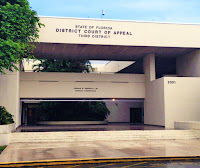Entry of Final Summary Judgment Will Terminate Ability to Accept Pending Proposal for Settlement
By Karma Hall, Esq.
In Kroener v. Florida Insurance Guaranty Association, Case Nos. 4D09-3604 & 4D09-4102 (Fla. 4th DCA June 22, 2011), Florida’s Fourth DCA was called upon to decide, as a matter of first impression in Florida, whether entry of final summary judgment would preclude a party’s ability to accept a pending proposal for settlement.
In Kroener v. Florida Insurance Guaranty Association, Case Nos. 4D09-3604 & 4D09-4102 (Fla. 4th DCA June 22, 2011), Florida’s Fourth DCA was called upon to decide, as a matter of first impression in Florida, whether entry of final summary judgment would preclude a party’s ability to accept a pending proposal for settlement.
In the underlying litigation, the trial court granted the
insurer’s motion for summary judgment on several theories, one of which had not
been previously considered in Florida. The issue of whether a party may accept
a pending proposal for settlement after entry of final summary judgment arose
after the undisputed facts revealed that the insurer had served a proposal for
settlement to the insureds on June 9, 2009, one day prior to a hearing on the
carrier’s motion for summary judgment. On June 10, 2009, the trial court
granted summary judgment in favor of the insurer, and final judgment was entered
on June 18, 2009. On June 22, 2009, the insureds submitted correspondence to
the insurer’s counsel indicating that they accepted the carrier’s proposal for
settlement. The insureds moved to compel enforcement of the proposal for
settlement. The trial court denied that motion, ruling that the entry of final
summary judgment terminated the insureds’ ability to accept the proposal for
settlement.
The insureds’ argument was based on the language of Fla.
Stat. § 768.79 and Fla. R. Civ. P. 1.442. Fla Stat. § 768.79(4) provides:
An offer shall be accepted by filing a written acceptance with the court within 30 days after service. Upon filing of both the offer and acceptance, the court has full jurisdiction to enforce the settlement agreement.
Fla. R. Civ. P. 1.442(f)(1) provides:
A proposal shall be deemed rejected unless accepted by delivery of a written notice of acceptance within 30 days after service of the proposal. The provisions of rule 1.090(e) do not apply to this subdivision. No oral communications shall constitute an acceptance, rejection, or counteroffer under the provisions of this rule.
The insureds argued that because neither the statute nor the
rule addressed nor shortened the time for acceptance in relation to a ruling on
summary judgment, the offer was “valid and open for acceptance” for the full
30-day time period, despite the entry of summary judgment.
The trial court disagreed. In reaching its decision, the
court analyzed nonbinding, persuasive case law submitted by both parties, and
cited Day v. Krystal Co., 241 F.R.D 474 (E.D. Tenn. 2007), wherein the court
stated:
Once a final judgment has been entered and the case is closed, any attempt to settle the case is then futile. . . . This is because when the Court entered a final judgment in favor of Defendant, the Court ended the litigation, and the need for settlement was no longer present. . . .
Summary judgment serves the same purpose as a determination
after trial. It concludes the case unless there are outstanding parties or
issues. Treating summary judgment the same as a judgment entered after trial
reconciles all the rules and is in keeping with the goals of finality in
litigation.
The Kroener trial court agreed, and the appellate court
affirmed, noting that under established Florida law, a party may not accept a
pending proposal for settlement after trial has commenced or a verdict has been
announced because “it would frustrate the purpose of Rule 1.442 to encourage
settlement, obviate the necessity of protracted litigation, and ‘totally defeat
the ends of justice and allow a mockery of the judicial system.’”
Click to view full opinion
Do you have property damage and need assistance?
The Law Office of Karma Hall, PA provides legal services throughout Florida, main office in Miami. Visit us online: www.karmahallpa.com; email info@karmahallpa.com.
x

Comments
Post a Comment